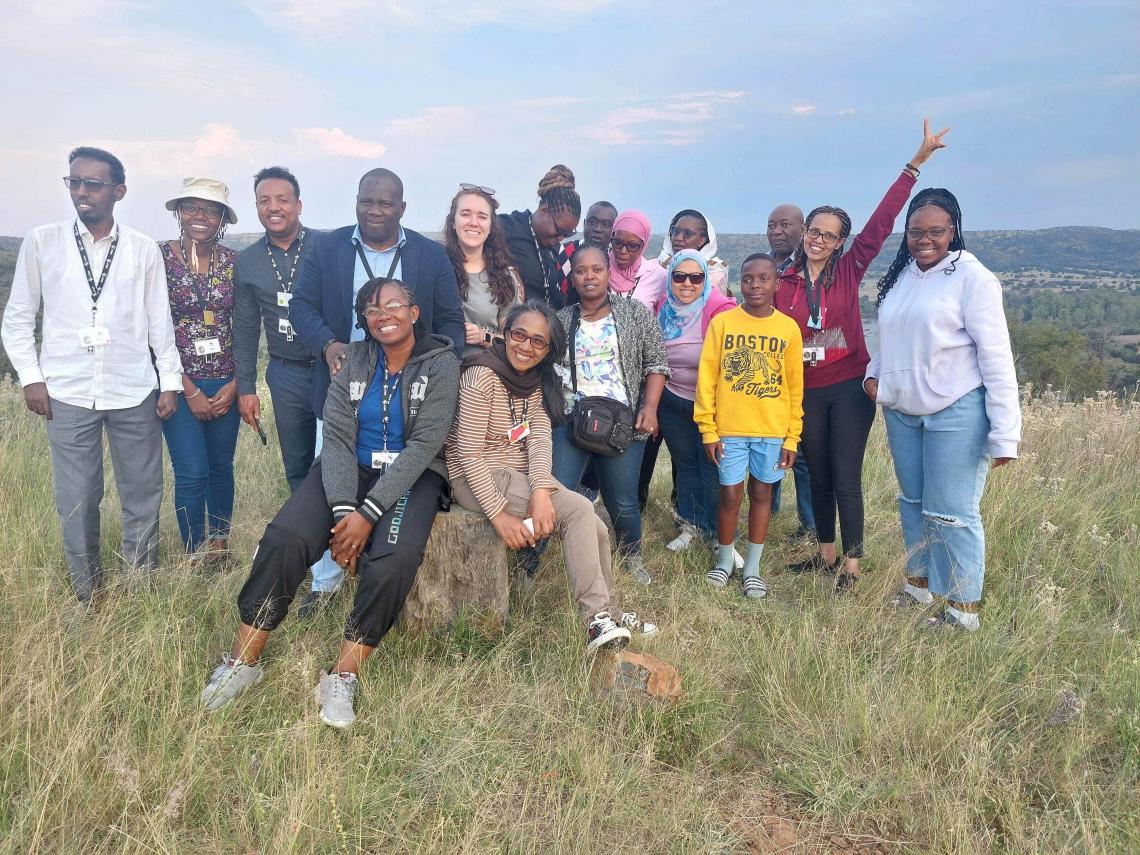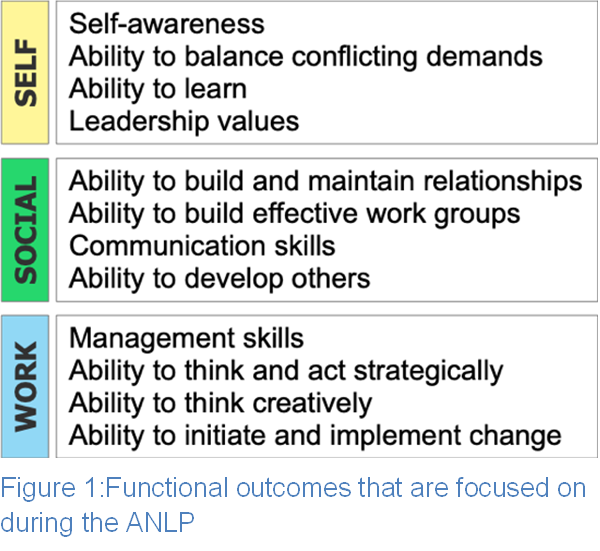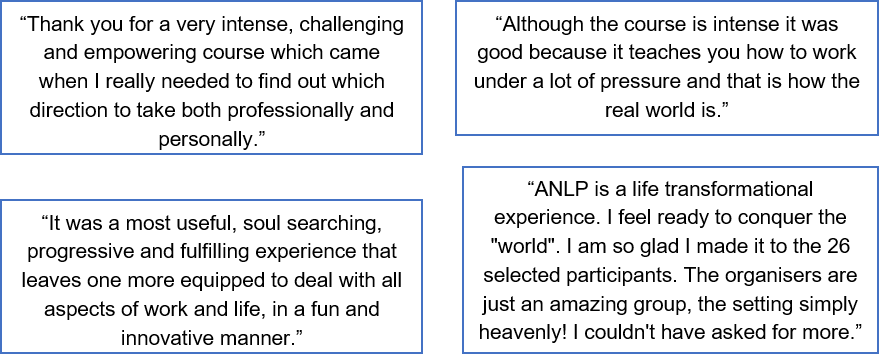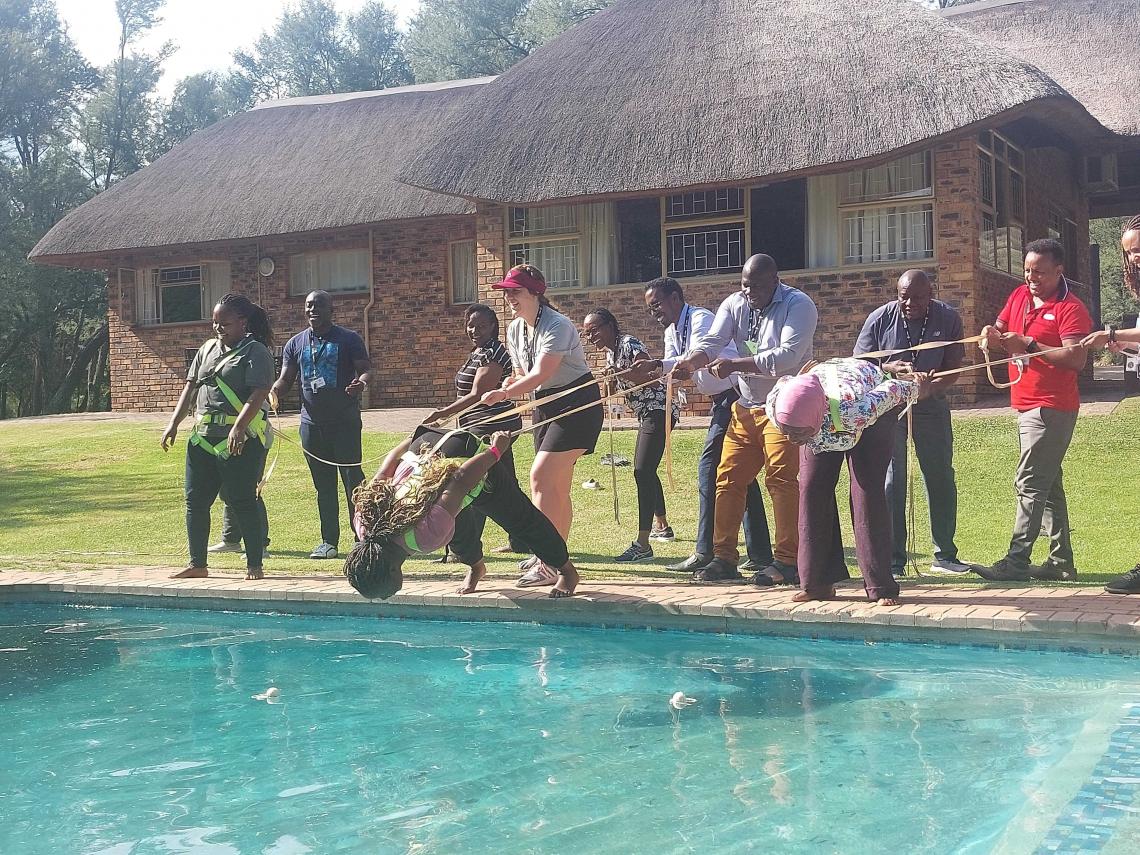Globally nutrition action requires a variety of technical and functional competencies. Nutrition is all about change and change is a complex process that is led rather than managed.
The aim of the African Nutrition Leadership Programme (ANLP), based at North-West University in South Africa, is to develop individual and institutional leadership capacity at various levels in nutrition across the African continent. The ANLP is committed to leadership development of early and mid-career nutrition professionals and related stakeholders and institutions. The ANLP offers a 10-day leadership development programmes for individuals, together with tailor-made leadership and functional capacity development programmes based on stakeholder/institution needs.
The ANLP approach to leadership training and development
- Leadership is a body of orientations, attitudes and behaviours that can be acquired.
- Leadership is not related to a position – leaders lead from where they stand.
- Managerial-Leadership, a combination of management and especially leadership orientations, attitudes, skills and behaviours is an important orientation to foster.
- Relationships with oneself and others are founded on integrity and trust.
- The result of leadership is to make the team members (institution) successful.
- Leaders have the responsibility to grow more leaders.
- Leaders have the ability to change and grow (self & others) continuously (learning, adapting, changing and applying) and to unleash their own and others’ potential.
- Leaders have the commitment to serve and to have purposes beyond self-interest.
- Leaders and followers have the resolve to find purpose and meaning in what they do.
- Leaders generate and focus team members’ energy to realise a vision.
- Leaders create an environment which people want to be part of and are committed to, and not just work for /be involved in the team/institution.
- Leading and managing change interventions successfully is an essential competence in Africa and for nutrition.
The ANLP approach to functional capacity building
- The ANLP believes in the value of investing in the continued growth and development of people.
- ANLP programmes are always based on the expressed and perceived needs of participants following a diagnostic process.
- ANLP programmes are hosted from a servant leadership perspective and we focus on the needs of the participants to learn and grow.
- The ANLP is sensitive to the principles of adult learning and expects the outcomes to be different for each individual.
- At the ANLP, we endeavour to also have fun in our approach to interactive learning.
- The ANLP believes that a variety of teaching strategies are essential to cater to the needs of participants.
- In ANLP programmes, the sharing of participants’ experience is often used to link to the material we present. Where possible we use experiential learning as a strategy – especially during longer workshops.
- During training events, the ANLP facilitating team, adds value by always being present, actively participating, picking up on what has been said, and sharing our experience (without being disruptive).
- The ANLP views workshops as events, an integrated whole and much more than a loose compilation of sessions. The ANLP always tries to integrate sessions, with a focus on the needs of the participants who are there to grow both as individuals and as leaders.
- The ANLP actively demonstrates the value and advantages of teamwork by working as a team.
- At the ANLP, we enjoy working with people who are positive, flexible and share our passion for creating environments within which individuals can grow – participants and facilitators alike.
The 10-day African Nutrition Leadership Programme for individuals
The 10-day ANLP Leadership Development Programme for individuals has been successfully hosted since 2002. Initially a single programme was held each year but the interest, indicating the need, has increased rapidly and two programmes are now hosted annually. Participants come from a wide variety of nutrition related disciplines in the government sector, the UN, civil society, academia and to a smaller extent from the private sector and individual consultants.
Goals of the 10-day ANLP
- Create an awareness of the individual’s leadership orientation and ability.
- Create an environment in which individuals can experience their strengths and growth areas and receive feedback on their progress.
- Develop a personalised action plan for growth beyond the 10-day programme.
- Establish the practice of reflection as a basis for continued self-discovery and growth.
- Experience how leadership capabilities affect team and work performance.
- Experience working in culturally diverse teams.
- Become part of a pan-African network that in future will become the backbone of leadership in nutrition on the continent.
- Commit themselves through a declaration of intent to personal action beyond the 10-day programme.
Objective of the 10-day ANLP
To promote each individual’s leadership development through increased self-awareness and reflection, in order to bring about leadership growth during and after the training programme.

Design of the 10-day ANLP
Research in leadership development has shown that leadership capability can be developed (Figure 1) and growth can be promoted by creating a challenging environment that forces individuals to apply themselves. The 10-day programme for individuals applies the leadership development model developed by the Centre for Creative Leadership (2003). This model promotes leadership development by eliciting experiences through multiple exposures that promote a greater self-awareness of the individuals.
Participants are divided into teams and committees and as part of these groups they have to undertake several challenging tasks at the same time as actively participate in the ongoing training programme. This results in multiple exposures and conflicting demands that promote greater self-awareness and growth across many fronts.
The exposures include:
- A variety of challenges, new experiences, stretch goals and conflict situations.
- Time for self-critical reflection together with peer feedback and opportunities for individuals to become aware of the gap between their current status quo and their desired leadership competencies.
- Continued reflection and feedback from peers and the ANLP Support Team.
- Support from the ANLP Support Team that encourages growth and provides individual guidance according to need.

Results of the 10-day ANLP
To date the ANLP has trained more than 500 individuals from 40 African countries. ANLP Alumni report having had both life and career changing experiences as a result of the 10-day programme.
The benefits and insights include:
- Improved self-leadership capacity.
- Greater awareness of where growth is needed.
- Greater awareness of possible limitations that cannot be changed but that need to be managed.
- A willingness to accept and give constructive criticism.
- Desire for further learning and growth.
- Being better equipped to manage conflicting demands.
- A greater understanding of what it means to lead from where you stand and gaining the confidence to do so.
- Being part of a large pan-African network.
- Being part of an ANLP declaration that fosters a common nutrition vision for Africa and challenges the individual to act now and lead form where they stand.
- Greater emotional intelligence.
2019 saw the first country specific ANLP 10-day programme being delivered. It was hosted in Ethiopia under the leadership of Ethiopian ANLP Alumni. Thirty 30 high-level local participants attended. It was a great success and other country Alumni groups have expressed an interest in this type of programme, with the aim of strengthening national nutrition leadership so as to ensure that national nutrition action plans and programmes are strengthened and scaled-up to deliver real impact.
Feedback of the 10-day ANLP


The 10-day ANLP in numbers
- Inception in 2002.
- Growth in applications from around 40 per year, to over 190 applications annually.
- Due to the overwhelming demand, the programme is now hosted twice a year.
- Two thirds of participants are women.
- On average 14 countries are represented at each 10-day programme.
- Average age of participants is 37 years.
- As of 2023 more than 500 participants from 40 African countries have participated.
Take a few moments to watch…. About us, and our participants
https://lnkd.in/dAACbXxJ
10-day ANLP Programme
The 25th edition of the ANLP will be held:
10 – 20 March 2026
Registrations and Applications closed on:
5 September 13:00 CAT
For more information visit our website at www.africanutritionleadership.org
Or contact us at Ronel.Benson@nwu.ac.za
